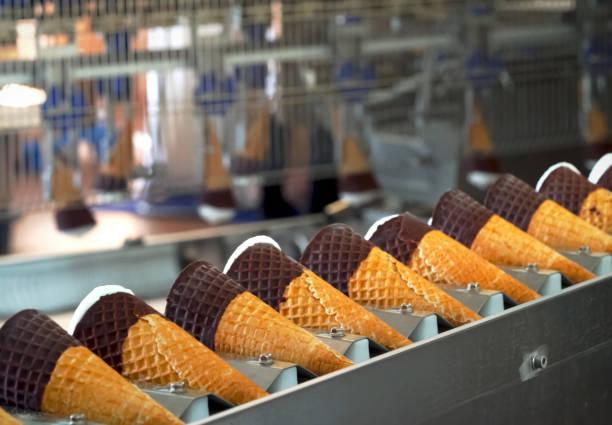-
Newsfeed
- ERKUNDEN
-
Seiten
-
Gruppen
-
Blogs
-
Entwickler
Food Processing Automation Market Growth: Technologies Driving the Next Industrial Shift

The global food industry is undergoing a profound transformation—one driven by automation, smart technologies, and the growing need for efficiency, safety, and scalability. As consumer expectations shift and global supply chains become more complex, food manufacturers are increasingly turning to automated systems to optimize processes and stay competitive. Thev Food Processing Automation Market is experiencing rapid growth, powered by advanced robotics, artificial intelligence (AI), machine vision, and IoT-enabled systems.
This next industrial shift is not just about replacing manual labor; it’s about creating smarter, connected, and more sustainable operations that deliver consistent quality on a global scale.
the market is expected to reach USD 31.2 billion by 2033, registering a robust compound annual growth rate (CAGR) of 12.8% over the decade.
𝐑𝐞𝐪𝐮𝐞𝐬𝐭 𝐏𝐝𝐟 𝐒𝐚𝐦𝐩𝐥𝐞 𝐇𝐞𝐫𝐞:https://m2squareconsultancy.com/request-sample/food-processing-automation-market/27
Rising Demand for Automation in Food Processing
Food processing companies face mounting pressure to increase production speed, reduce costs, and meet stringent regulatory standards. Automation helps bridge this gap by enabling:
-
Faster production with fewer errors
-
Improved hygiene and food safety
-
Real-time monitoring and traceability
-
Reduced labor dependency in repetitive or hazardous tasks
-
Optimized raw material usage and waste reduction
As a result, manufacturers—from beverage processing plants to bakery and meat facilities—are integrating automated technologies to streamline operations and ensure consistent product quality.
Key Technologies Powering Market Growth
1. Automation Robotics
Robots have become central to modern food processing plants due to their precision and reliability. Today’s robots can handle delicate tasks like slicing, sorting, cutting, and packaging without damaging the product.
-
Pick-and-place robots speed up packaging lines.
-
Collaborative robots (cobots) work safely alongside humans.
-
High-speed robotic arms improve throughput and maintain consistency.
Their ability to operate in cold, sterile, or hazardous environments makes them ideal for meat, seafood, and frozen food production.
Buy Now Report:https://m2squareconsultancy.com/purchase/27
2. Artificial Intelligence and Machine Learning
AI is at the heart of the new industrial automation wave. Machine learning models help manufacturers predict demand, optimize processing parameters, and identify defects with greater accuracy than the human eye.
AI-powered applications include:
-
Predictive maintenance to minimize equipment downtime
-
Automated quality inspection using machine vision
-
AI-driven process optimization for consistent production output
With AI, plants become more efficient, responsive, and capable of large-scale customization.
3. Machine Vision Systems
Machine vision enhances quality control by enabling automated inspection and grading of food products. Using high-resolution cameras and sensors, machine vision detects:
-
Shape and size irregularities
-
Contamination or foreign objects
-
Color and texture defects
-
Packaging inconsistencies
This reduces human error and ensures regulatory compliance, particularly in high-risk segments like dairy, meat, and packaged foods.
4. Internet of Things (IoT) & Smart Sensors
IoT plays a critical role in creating connected food processing environments. Smart sensors track temperature, humidity, pressure, flow, and energy consumption across the production line.
Benefits include:
-
Real-time performance monitoring
-
Automated alerts for quality deviation
-
End-to-end visibility and traceability
-
Optimized resource usage and lower energy costs
When integrated with cloud platforms, IoT enables remote operations, enhancing flexibility and decision-making.
5. Advanced Packaging Automation
Packaging accounts for a significant portion of the food production value chain. Automated packaging systems—featuring robotics, smart conveyors, and sealing technologies—deliver:
-
Faster labeling, sorting, and palletizing
-
Better protection and longer shelf life
-
Reduced human contact to ensure hygiene
-
Lower operational costs
Smart packaging systems powered by sensors even provide freshness indicators, transparency, and tamper detection.
Market Drivers Behind the Automation Surge
Several macro factors are accelerating the adoption of automation in food processing:
✔ Labor Shortages
Manufacturers globally are facing a shortage of skilled labor. Automation offers a reliable alternative for repetitive or physically demanding tasks.
✔ Growing Focus on Food Safety
Stringent food safety regulations from bodies like FDA and FSSAI are prompting companies to adopt automated systems that ensure consistency and reduce contamination risks.
✔ Increasing Consumer Demand
Consumers now expect high-quality, safe, and affordable food products with shorter delivery cycles—requirements best fulfilled by automated production lines.
✔ Rising Operational Costs
Automation reduces waste, optimizes resource usage, and improves energy efficiency, helping companies reduce long-term costs.
The Future of Food Processing Automation
As digital transformation accelerates, the future of food processing automation will revolve around:
-
Fully connected smart factories
-
Predictive and adaptive manufacturing
-
Greater use of AI-powered robotics
-
Autonomous quality assurance
-
Sustainable production with reduced carbon footprint
Companies that invest in automation today will gain a decisive competitive edge in productivity, compliance, and cost efficiency.
Access Full Report:https://m2squareconsultancy.com/reports/food-processing-automation-market
Conclusion
The food processing automation market is entering its next major growth phase, fueled by cutting-edge technologies and the need for smarter, safer, and more efficient operations. From robotics and AI to IoT and machine vision, automation is reshaping the global food industry and setting new standards for quality and performance.
Businesses that embrace this industrial shift will be better positioned to meet evolving consumer demands, navigate global competition, and build resilient, future-ready operations.
Related Reports:
https://m2squareconsultancy.com/reports/smart-agriculture-market
https://m2squareconsultancy.com/reports/global-organic-fertilizer-market
https://m2squareconsultancy.com/reports/patient-monitoring-devices-market
https://m2squareconsultancy.com/reports/3d-bioprinting-market
About M2 Square Consultancy
M2 Square Consultancy is a purpose-driven market research and consulting firm dedicated to turning data into insight. Established in 2023, the company helps businesses make strategic, informed decisions through robust feasibility studies, competitor intelligence, and trend forecasting
Get in Touch
Ready to elevate your strategy or explore custom market insights? Reach out to the team directly:
Email: [email protected]
Phone (India): +91 80978 74280
Phone (US): +1 929 447 0100
- Books
- Software
- Gruppen
- Filme
- Art
- Causes
- Crafts
- Dance
- Drinks
- Film
- Fitness
- Food
- Spiele
- Gardening
- Health
- Startseite
- Literature
- Music
- Networking
- Andere
- Party
- Religion
- Shopping
- Sports
- Theater
- Wellness
